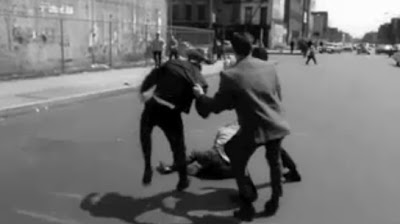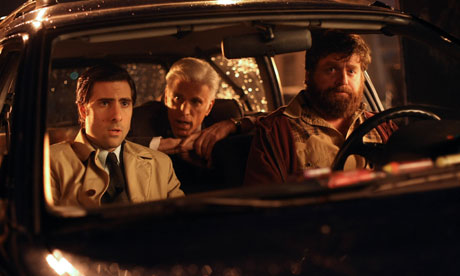 |
It is a rarity for even the greatest director to strike gold at the very beginning of their career. Few and far between have broken the amateur barrier (Quentin Tarantino, Sam Mendes, and The Coen Brothers are rare exceptions), but even when they don’t, future greatness can be seen in a scrappy debut effort. “Who’s That Knocking at My Door,” the very first movie made by Martin Scorsese, is not the kind of seamless masterpiece he would late go on to make, but it foreshadows a career steeped in Italian-American culture, New York City, and crushing Catholic guilt.
“Who’s That Knocking at My Door” has all of the signs of a film school effort: blatant symbolism, aimless dialogue, and rough cuts. Indeed, Scorsese began making this movie while he was a student at NYU, and he continued working on it even after he graduated. The then unknown Harvey Keitel stars as J.R., a young Italian-American hoodlum who hangs out with a pretty volatile group of guys, yet that doesn’t stop him from going to church to pay penance.
J.R. is the embodiment of what Scorsese must have been like in those days: he seems to only know what he sees in the movies and what he learns in Church. This basically entails knowledge of every John Wayne movie. To him, “The Searchers” is like another kind of gospel. His dialogue about Wayne is some of the finest, most naturalistic writing in any Scorsese film.
The girl in the movie (Zina Bethune), simply named The Girl, becomes J.R.’s new object of affection, and his love with her ends up testing everything else he holds dear. After their relationship buds, Girl reveals that she was once raped in a chilling flashback sequence that resembles what a filmed version of Joyce Carol Oates’s “Where Are You Going, Where Have You Been?” would look like. As a man loyal to his Catholic background, this makes him question his own faith, and what is really most important to him in his life.
This revelation does not come until very late in this film’s short running time. “Who’s That Knocking at My Door” does not contain the typical kind of plot. Rather than an event inspiring a series of actions that effects everyone, it is instead about an event inspiring a series of emotions that effects just two characters.
“Who’s That Knocking at My Door” might feel inconsistent and messy because it seems less like an attempt to capture a fully realized story on screen but more like someone trying to capture the mixed emotions that make up their life on film. The irony of the sunny, happy-go-lucky music that plays in the credit sequence against footage of a man being beaten shows that this type of aggression was just a way of life where Scorsese grew up. The casual attitude of this scene is still shocking to watch. Meanwhile, playing “Who’s That Knocking?” during the end sequence in the Church as the camera pans around all of the different representations of Jesus makes it feel less like a solemn walk through a holy place and more like a ride at Disney World.
Watching Scorsese’s work on “Who’s That Knocking at My Door” is like watching a diamond in the rough that would soon become one of the f***ing brightest gems in the history of cinema. From it, you can see where the basis of “Mean Streets,” “Taxi Driver,” and “Raging Bull” amongst many others came from. Even “Hugo,” which is about a child who is much more eccentric than J.R. can draw its obsessive conversation about film back to Scorsese’s debut.
Film can be one’s attempt to show what they believe matters most in life and with “Who’s That Knocking at My Door” Scorsese was establishing everything he loves and everything he values. And while his big debut certainly isn’t flawless, we haven’t been able to leave his side since.






